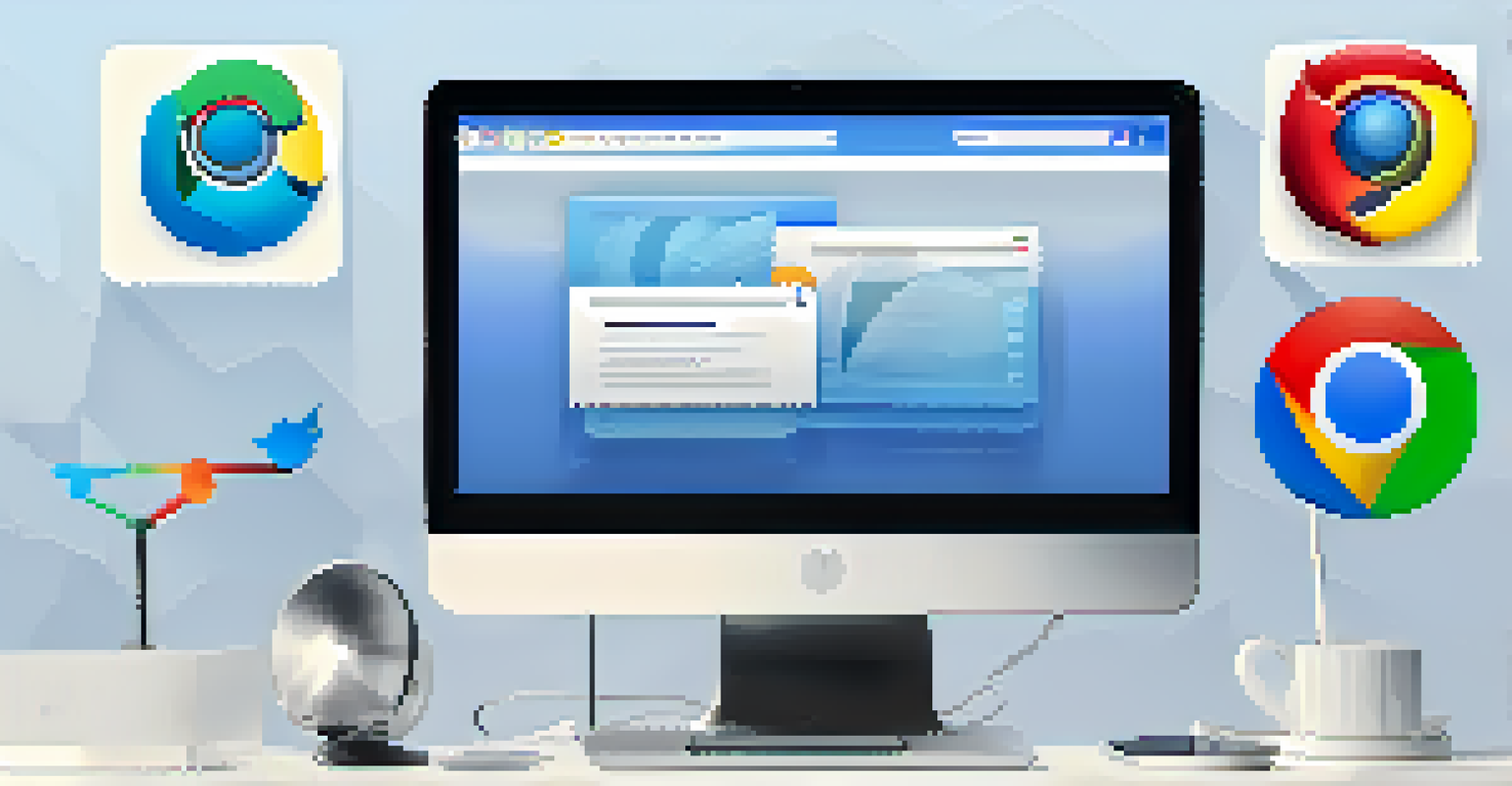Essential Tools for Building Digital Literacy Skills

Understanding Digital Literacy: What It Means Today
Digital literacy goes beyond just knowing how to use technology. It encompasses the ability to find, evaluate, and communicate information effectively using digital platforms. In today's world, being digitally literate means navigating the internet with confidence and making informed decisions based on the information available.
Digital literacy is not just about technology. It’s about understanding how to analyze and use information in the digital world.
With the rapid advancement of technology, cultivating digital literacy skills is essential for both personal and professional growth. It helps individuals not only in their job searches but also in everyday tasks like online banking, shopping, and keeping in touch with loved ones. In essence, digital literacy empowers you to thrive in a tech-driven society.
Moreover, digital literacy fosters critical thinking and responsible online behavior. As we encounter misinformation and digital privacy concerns, being digital literate equips us to discern credible sources from unreliable ones, ensuring that we engage with technology in a safe and informed manner.
Web Browsers: Your Gateway to Information
Web browsers like Google Chrome, Firefox, and Safari are essential tools for accessing the vast ocean of information online. They serve as your primary interface for navigating the internet, allowing you to search for information, access websites, and engage with various digital resources. Learning to use browser features effectively can enhance your online experience immensely.

For instance, utilizing bookmarks can help you organize your favorite sites, while browser extensions can improve your productivity and security. Ad-blockers can streamline your browsing experience by eliminating distractions, and password managers can keep your online accounts secure. Familiarizing yourself with these tools will make your internet use more efficient and enjoyable.
Digital Literacy Empowers Growth
Being digitally literate enhances personal and professional skills, enabling informed decision-making in a tech-driven world.
Additionally, understanding how to manage your browser's privacy settings is crucial. This allows you to control what information is shared while you browse and helps protect your digital footprint from unwanted tracking. A good grasp of browser functionalities not only elevates your digital literacy but also enhances your overall online safety.
Search Engines: Mastering Information Retrieval
Search engines like Google and Bing are the backbone of online research, making them vital tools for building digital literacy. Knowing how to effectively use search engines can drastically improve your ability to find relevant information quickly. Using specific keywords, quotes, or even advanced search operators can yield more precise results.
The internet is becoming the town square for the global village of tomorrow.
For instance, if you're looking for scholarly articles on climate change, using phrases like 'climate change effects site:.edu' can help you find academic sources. Additionally, understanding how search engines rank pages allows you to evaluate the credibility and relevance of the information you encounter. This skill is crucial in a world full of noise and misinformation.
Moreover, learning to recognize sponsored content versus organic search results is an important aspect of digital literacy. Knowing the difference can help you critically assess the information's reliability and bias, leading to more informed decision-making. Ultimately, mastering search engines is a fundamental step in becoming a savvy digital citizen.
Social Media: Navigating Digital Communication
Social media platforms like Facebook, Twitter, and Instagram are powerful tools for connecting with others and sharing information. However, they also require a level of digital literacy to navigate effectively and responsibly. Understanding the nuances of each platform can help you communicate your message clearly while also respecting community guidelines.
For example, being aware of privacy settings allows you to control who sees your posts and personal information. Additionally, knowing how to identify and report harmful content can contribute to a safer online environment for everyone. Digital literacy in social media also involves recognizing the potential impact of your online presence on your personal and professional life.
Web Browsers Enhance Online Navigation
Mastering web browser features improves your ability to efficiently access and manage information online.
Furthermore, engaging with social media critically means questioning the information you consume and share. It’s essential to verify facts before reposting articles or opinions, as misinformation can spread quickly. By approaching social media with a discerning mindset, you can leverage its benefits while minimizing the risks.
Online Learning Platforms: Expanding Your Knowledge Base
Online learning platforms like Coursera, Udemy, and Khan Academy offer a wealth of courses that can enhance your digital literacy skills. These platforms empower learners to acquire new skills and knowledge at their own pace, making education more accessible than ever. From basic computer skills to advanced data analysis, there’s something for everyone.
Taking advantage of these resources not only boosts your technical skills but also instills a sense of lifelong learning. For instance, learning about digital marketing can help you understand how businesses operate online, while courses on cybersecurity can protect you from online threats. These skills are invaluable in today’s job market.
Moreover, many platforms offer certificates upon completion, which can enhance your resume and showcase your dedication to professional development. Engaging with online courses encourages a proactive approach to learning and equips you with the tools necessary to navigate the digital landscape confidently.
Productivity Tools: Streamlining Your Digital Workflow
Productivity tools such as Google Workspace, Microsoft Office, and Trello can significantly enhance your digital literacy by improving your organizational skills. These tools help you manage tasks, collaborate with others, and streamline your workflow, making it easier to stay on top of your responsibilities. Learning how to use these applications can save you time and effort in both personal and professional settings.
For example, Google Docs allows you to collaborate in real-time with others, making group projects more efficient. Meanwhile, project management tools like Trello help you visualize your tasks and deadlines, ensuring you stay organized. Familiarizing yourself with these tools is essential to maximizing productivity in a digital environment.
Social Media Requires Critical Thinking
Navigating social media responsibly involves verifying information and understanding its impact on personal and professional life.
Additionally, understanding how to integrate different tools can lead to even greater efficiency. For instance, you can link your calendar with task management software to keep track of deadlines seamlessly. This integration not only enhances your workflow but also showcases your ability to adapt to various digital tools.
Digital Communication: Email and Beyond
Email remains one of the most important forms of digital communication in both personal and professional contexts. Mastering email etiquette, such as using clear subject lines and addressing recipients appropriately, is crucial for effective communication. Understanding how to organize your inbox with folders and labels can also enhance your email management skills.
Beyond email, other forms of digital communication—like instant messaging apps and video conferencing tools—require different skills. Familiarizing yourself with platforms like Slack or Zoom can improve collaboration and engagement with colleagues or classmates. Each tool has its own set of features, and knowing how to leverage them can enhance your overall communication effectiveness.

Furthermore, being aware of digital communication’s impact on relationships is vital. Understanding how tone and context can change the message can help you avoid misunderstandings. By honing your digital communication skills, you can foster better connections and navigate virtual interactions with confidence.